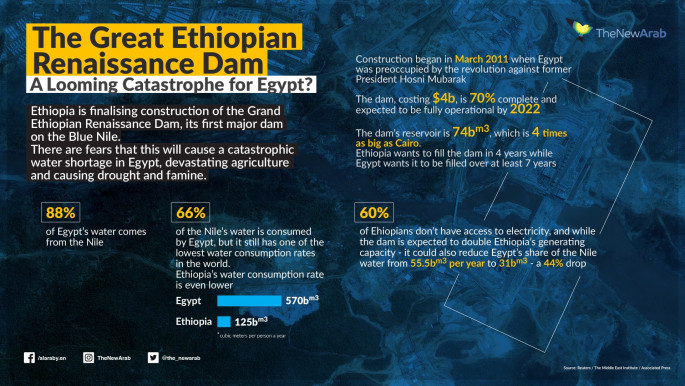Ethiopian foreign minister blames 'Egyptian stubbornness' for stalling of Nile dam negotiations
Ethiopia's Foreign Minister Gedu Andargachew on Tuesday blamed stalled negotiations on the controversial Great Ethiopian Renaissance Dam (GERD) on "Egyptian stubbornness", adding a further obstacle to ending disagreements on Nile waters.
Egypt, Sudan, and Ethiopia have been negotiating over the dam since November 2019 but in February this year, Addis Ababa refused to sign an agreement controlling the flow of Nile water to Egypt, increasing tensions between the two countries.
The latest round of talks, which began on 9 June, have been marked by mutually accusatory statements from Egypt and Ethiopia and sabre-rattling from the Ethiopian side.
"Egypt came to the latest negotiation with one leg on the talks and another aimed at lodging complaint to the UN Security Council," the Ethiopian private broadcaster FANA quoted Andargachew as saying.
"Egypt wants to take everything for itself with no readiness to give," he added.
The main issue of dispute is the speed at which Ethiopia will fill the dam. Egypt wants the dam to be filled slowly, over several years, to ensure that it has enough water to meet its people's needs. Ethiopia says it has the right to fill the dam without consulting Egypt, in order to make it fully operational.
Cairo has argued that if the dam is filled too quickly, the flow of Nile water to its territories could be dramatically reduced, causing drought and famine.
Read more: Ethiopia's Great Renaissance Dam - A catastrophe for Egypt?
Egypt currently receives roughly 55.5 billion cubic metres of Nile water a year and wants to ensure that its supply stays above 40 billion metres. Sudan receives 18 billion cubic metres. Ethiopia says that it does not want to cause harm to Egypt but needs to generate electricity for its people through the GERD.
An Ethiopian general threatened on Friday to defend the dam by force against Egypt if necessary, while in May there were reports that Ethiopia had deployed missiles to the vicinity of the dam.
In May, Egypt wrote a letter to member states of the UN Security Council saying that Ethiopia's filling of the dam could "jeopardise the water security, food security and indeed the very existence of over 100 million Egyptians who are entirely dependent on the resource of the Nile River for their livelihoods".
Andargachew said on Tuesday that Egypt was refusing to divide the waters of the Nile fairly and was looking to monopolise the river.
Al-Jazeera reported that the current round of negotiations, which are being conducted via video-link because of coronavirus, had stalled because of Ethiopia's reservations about signing a binding long-term agreement on the flow of Nile waters.
It quoted two anonymous sources as saying that Egypt and Sudan had proposed a compromise whereby they would store an additional reserve of Nile water in addition to the 74 billion cubic metres they already use.
This reserve would be used if the filling of the Ethiopian dam causes drought in their countries.
Ethiopia, however, had not responded positively to this proposal, the sources said.
On Monday, a spokesperson for Egypt’s ministry of water resources and irrigation said that Ethiopia was attempting to make Egypt and Sudan "hostages to Ethiopia's will and whim" and expressed pessimism regarding the end results of the negotiations.

Follow us on Facebook, Twitter and Instagram to stay connected



